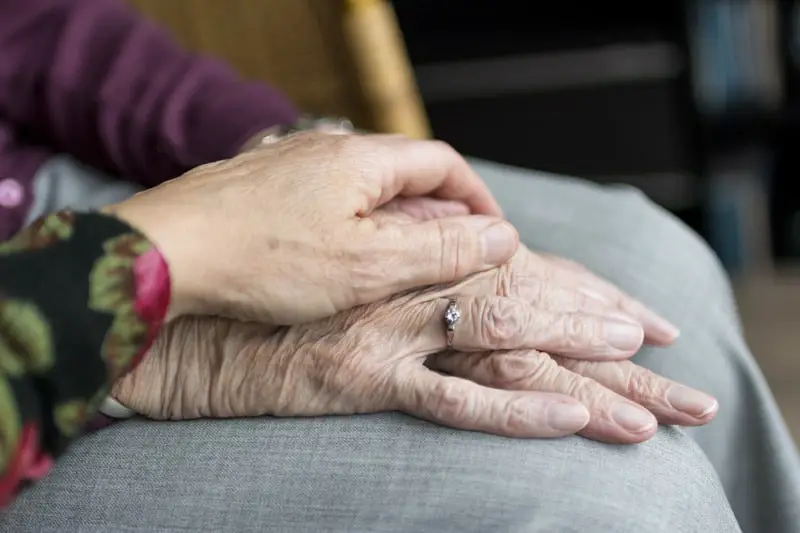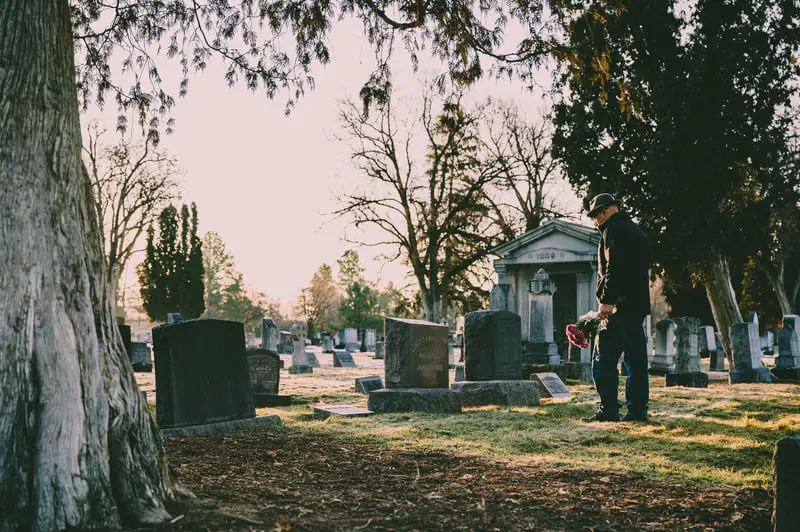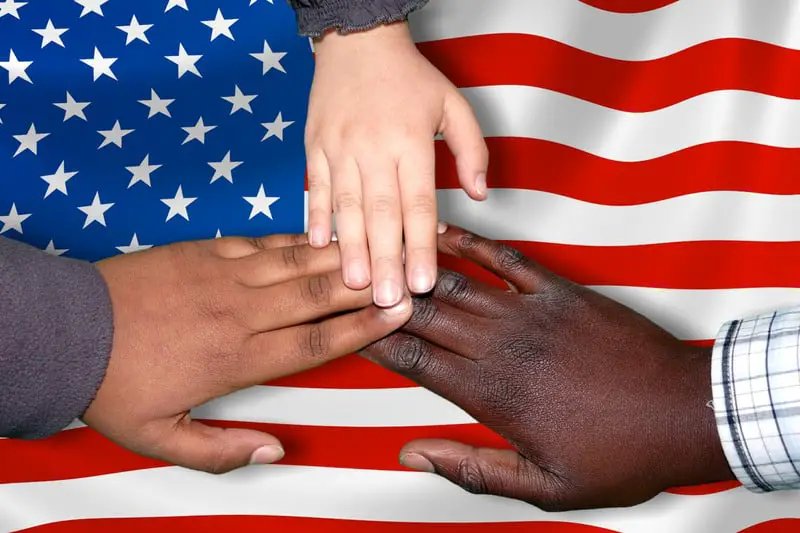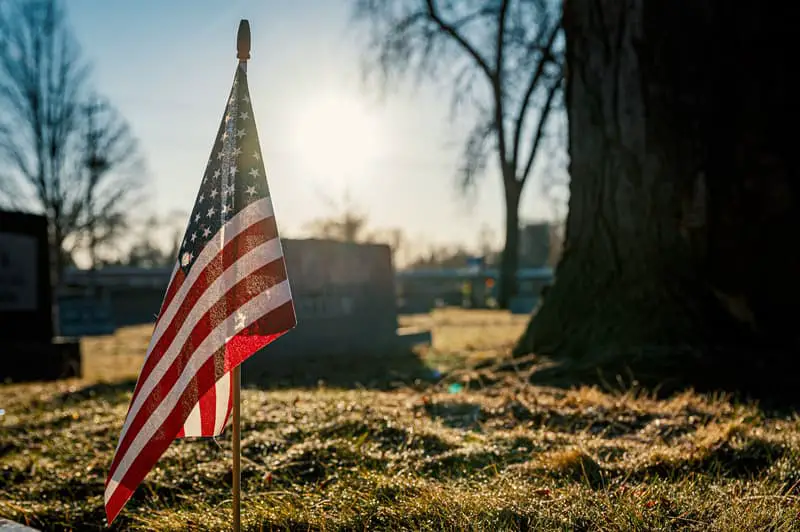Nationwide and locally, there are many nonprofits that are dedicated to lowering the cost of funeral expenses.
It is a surprise to no one that funerals are not cheap. Funeral homes, a vault, embalming, facilities, and staff for funerals and viewings can add up to thousands of dollars very quickly.
Luckily, these ten nonprofit organizations can help alleviate the cost of funerals for those who cannot afford the expense.
If burying a child, national nonprofits Final Farewell and The TEARS Foundation are top charities for funeral aid. Those who have lost an adult can seek assistance through FEMA, VA, and other nonprofits specific to the deceased’s local area.
Depending on your circumstances and where you live you could benefit from the aid of one of the 11 non-profit organizations I’m going to talk about in this article.
Continue reading for details on each national and local nonprofit, and how to qualify for aid.
I’ve also included some additional options if none of these is a great fit, so read on to the end.

National Nonprofits
National nonprofits that work to alleviate costs for families burying a loved one are a good place to start when researching funeral aid. They offer support in funeral costs, reimbursement, cremation, headstones, and more.
1: Final Farewell

Final Farewell’s mission focuses on families that are burying a child. The nonprofit helps alleviate the expenses for those who need advice, guidance, and an affordable ceremony for their child under the age of 18.
While Final Farewell is most active in the Philadelphia area, it is a national nonprofit that can assist families across the United States. The nonprofit does not provide financial assistance to those who have lost someone over the age of 18 but will provide guidance to all families.
Final Farewell can give grants to families to help pay for funeral costs, with the neediest families receiving all funeral services at no cost.
The organization also negotiates with funeral homes in order to get the best pricing for the family and solicits donations from funeral homes and cemeteries.
Funding for this nonprofit comes from multiple sources including private donors, government grants, and fundraisers. In addition, Final Farewell received a charitable tax exemption from the IRS.
Final Farewell is run by an unpaid Board of Directors and many community volunteers. Final Farewell has no official employees or paid contractors. The nonprofit seeks to put all donations and funds into the pockets of those who need funeral assistance.
Financial assistance can be extended to families that meet the Final Farewell Poverty Guidelines, which are updated every year.
The Poverty Guidelines are the same as the Assistant Secretary for Planning and Evaluation of national guidelines or ASPE. More guidelines can be found on the ASPE website. Guidelines are based on yearly income and the number of people in a family or household.
To apply for help, fill out a questionnaire on Final Farewell’s website. The questionnaire will ask basic questions regarding your name, the deceased, and then a final area where a person can include a detailed description of what service they are looking to receive.
2: The TEARS Foundation

The TEARS Foundation helps relieve the financial burden of burial or cremation services for families who have lost children. The nonprofit also connects families with other support groups and companions who have also lost children in order to help with grieving.
Services that The TEARS Foundation provides include financial and emotional support. The TEARS Foundation has served thousands of families across the United States who have lost loved children.
Those who have lost a child are asked to fill out an online application form in which a member of The TEARS Foundation will be in contact within 48 hours.
Financial assistance provided includes funeral home and cemetery costs. Funds will be given directly to the funeral home or cemetery.
In order to qualify for aid, a family must apply to one of three categories. Babies from 20 weeks gestation to 1-year-old, and babies between 1 and 2 years old who die from external causes but not by sickness.
External causes include suicide, accident, or sudden unexplained death of a child. If a child is between the ages of 13-20, The TEARS Foundation can provide funeral assistance and grief counseling support (speak to a trained professional from the comfort of your own home.
For babies from 20 weeks gestation to 1 year old, financial assistance can be provided, or a family can apply for a flat granite grave marker if it has been 6 months since the baby has passed away. Financial assistance up to $500 for burial services will be offered, and up to $250 for cremation services.
Financial Assistance is available for those living in Alabama, Alaska, Arizona, California, Delaware, Florida, Georgia, Illinois, Maryland, Massachusetts, Michigan, New Hampshire, New Jersey, New York, North Carolina, Pennsylvania, Texas, Washington State, and Wyoming.
For those applying for a grave marker, aid is available for those living in Alaska, Massachusetts, Michigan, New Jersey, North Dakota, Washington, and Wyoming.
For diseased children between the ages of 13 and 20 who have died due to suicide or drug-related causes, grief counseling and some financial assistance are available.
When filling out the online application, the applicant must choose which type and category of support they are seeking. If seeking help for emotional support and therapy, the applicant need only to fill out the first page. For those seeking financial assistance, there is a longer and more in-depth application.
3: Funeral Consumers Alliance

The Funeral Consumers Alliance is a national nonprofit that works with the funeral industry in order to advocate good and fair prices for those needing to plan for funeral expenses.
The Funeral Consumers Alliance has a large network of volunteers working with consumers and those working in the funeral industry to help support those who are grieving across the United States.
Funeral Consumers Alliance works closely with those who have lost a loved one in order to help their decision-making process and increase awareness of various funeral options that will save the griever money.
The nonprofit offers print and online publications on funeral choices and options, how to care for the dead without using a funeral home, and monitors funeral industry trends to expose abuses of power within the industry.
This organization also advocates for consumer rights when preparing for a funeral and works with other national organizations that share a similar mission in order to expand the network of help for people who have lost a loved one.
Anyone can benefit from the Funeral Consumers Alliance as there is no income barrier, and many of their resources are online free for public use. Their top tips for saving money during funeral costs are to find out how much a person can afford, set a budget, and shop around.
Setting a standard of how much can be afforded will be helpful in making sure expectations for the deceased’s funeral are realistic. Remember, the amount of money put into a funeral does not equate that person’s impact or how much they were cared for in life.
Once the budget is set, it can be clearly communicated to the funeral home so they do not try to push “extras” on the buyer. Many funeral homes will try to get consumers to pay for unnecessary add-ons in order to make more money. Be strict with what can be spent and they won’t have much wiggle room to push.
After the budget is set, shop around for the best deals. Some funeral homes in the same town will have hundreds of dollars of difference in the same services.
Shopping around will be time-consuming, but it will be worth it in the end because of the money saved. For more in-depth advice, check out the Funeral Consumer’s Alliance consumers section of their website.
4: Children’s Burial Assistance

Children’s Burial Assistance is a charitable organization that helps families to bury their deceased children. Based in Georgia but helping families across the nation, the nonprofit helps families with burial plots, vaults, grave liners, cremation expenses, and grave fees.
Children’s Burial Assistance has helped over 1,000 families save over $900,000 in funeral expenses and service fees. The organization is possible through its large network of volunteers.
Volunteers establish good relationships with funeral service providers, casket-making companies, and crematories to ensure a positive relationship in all aspects of the nonprofit.
Qualifications for the program include families who need assistance in burying a deceased minor aged 1-17. Three forms of help are available, including gifts-in-kind, the Children’s Burial Assistance research database, and financial assistance.
Gifts-in-kind are donated gifts of open and close grave fees and burial plots. Children’s Burial Assistance will work with funeral homes and directors in order to obtain these gifts. Gifts are not guaranteed and will only be offered if available.
Children’s Burial Assistance database includes crematories, cemeteries, grave makers, funeral homes, headstone companies, casket makers, florists, and all service providers who are involved in funeral preparations.
These providers have a pre-existing and positive relationship with the Children’s Burial Assistance and will provide low-cost and at-cost services for families that Children’s Burial Assistance is working with.
If the nonprofit has low funding, then the database is called upon to help the families seek assistance in order to save more money.
Children’s Burial Assistance provides financial assistance towards grave fees and cremation services. The money is paid to the funeral provider and not directly given to the family. The money will be allocated depending on family needs.
Families are eligible for assistance if the deceased child had no life insurance and the family has little or no savings to pay for a funeral service and the associated fees.
In order to apply, a family member, parent, or legal guardian of the deceased must apply online on their website. After the application is submitted, the nonprofit will make a decision whether or not to aid the family as quickly as possible.
The application will inquire details about who is filling out the application and the deceased. The person applying for aid will also need to give information about the types of services they need, their income, and details on the deceased life insurance or lack thereof.
If you are reading this and thinking, wow maybe I should get some cover, then feel free to learn about my recommended life insurance brokers here.
5: Veterans Affairs

If the person who has passed was a veteran, they may qualify to receive a monetary death benefit.
Funeral expenses will be reimbursed by Veterans Affairs to those surviving the deceased post-funeral. The VA can pay burial and plot expenses. If the death is non-service related, the maximum amount allotted is $300. In case of a service-related death, the maximum allotted is $2,000.
In order to qualify for aid from Veterans Affairs, a person must have paid for a Veteran’s burial and funeral. The buyer must not have been reimbursed by any other government agency or another source such as the veteran’s employer. The veteran must have not been discharged under dishonorable conditions.
The veteran must have died because of a service-related disability, was receiving or was eligible for VA pension at the time of death.
The VA will not pay for a veteran’s burial if they died during active military service or was a member of Congress who died in office or was a federal prisoner.
In order to apply, a person must provide evidence of death, receipt of funeral costs, and a statement of the funeral director or cemetery owner. In order to apply for reimbursement, apply online at va.gov or submit a paper application.
For more information, please read my full article on finding help with funeral costs for a veteran.
6: Federal Emergency Management Agency (FEMA)

The Federal Emergency Management Agency, or FEMA, can financially assist eligible families in burying a loved one. FEMA services include the cost of a casket or urn, mortuary services, transportation of the deceased or two family members to an area to identify the deceased, up to five Death Certificates, cremation, marker, or headstone, and cost of reinterment.
To be eligible for aid, a person must submit paperwork for FEMA to verify in that person’s state of residence.
The documents needed include a death certificate, documentation from a medical examiner or coroner, proof that the applicant is responsible for funeral costs, and evidence of an unmet funeral expense in the form of a receipt from the funeral service provider. The applicant also must not receive any aid from another organization.
In order to apply for aid, a person must go to the FEMA website and submit an application.
7: State and Local Nonprofits

While the national nonprofits listed above are active in providing aid to those paying for funerals, a person might have more luck doing research regarding nonprofits specific to their state or region.
Local nonprofits have a smaller scope and may be able to respond to an application faster than a national nonprofit. Below are funeral nonprofits in Washington DC, Massachusetts, and Illinois, but many states across the country have similar programs put in place to help families in their time of need.
Consult Funeral Direct for a state-by-state analysis on what help is available.
8: Economic Security Administration (ESA) Burial Assistance – Washington, DC

The ESA Burial Assistance assists those living in the Washington, DC area with funeral costs. The program gives a maximum of $1,000 to the cost of a burial or $650 towards the cost of cremation.
Assistance is given after eligibility criteria are met and the total cost of the burial or cremation does not exceed $2,000. If the casket is oversized, the burial cannot exceed $3,000 to qualify for aid. Payments are made directly to the funeral home.
A person is eligible to aid if the deceased person did not have more than $1,000 on the date of their death. This includes all bank accounts, final paychecks, and Social Security checks.
If the person is married, then the income of the spouse will be considered, and the income of guardians will be considered if the deceased was a child.
The deceased must have been a resident of the District of Columbia, and the burial or cremation services have to be arranged through a service that has a contract with the District.
Funeral homes that are under contract with the District include Ronald Taylor Funeral Home, Hackett Funeral Chapel, Hunt Funeral Home, and McLaughlin Funeral Home.
A person must apply in person in order to receive aid. Travel to the Economic Security Administration building in Washington, DC to complete an application.
When completing an application, the person must bring a verification of income and assets. Pay stubs and bank statements of the deceased will be sufficient.
Proof of address for the deceased is also necessary in the form of a lease or utility bill. The applicant’s relationship with the deceased must be proved, and the deceased’s social security number should be provided.
More questions can be answered on the ESA burial site or by calling their offices.
9: Department of Transitional Assistance (DTA)- Massachusetts

The Department of Transitional Assistance, or DTA, assists low-income families with funeral and burial costs in Massachusetts. Assistance will depend on the individual’s or families’ resources to pay.
If the deceased was living in Massachusetts at the time of their passing, they may apply for cost assistance for up to $1,100.
The total cost of funeral, cremation, or burial cannot exceed $3,500 to be eligible for aid. Many funeral homes in Massachusetts are aware of the price stipulation and will be able to help make the funeral costs stay below $3,500.
When applying for aid, a person must owe a balance to the funeral home or director. Payment from the DTA is made directly to the funeral home, or if there are no relatives of the deceased, a funeral director can apply for aid.
An outstanding bill is necessary to receive reimbursement. You will not be reimbursed if you have already paid your bill.
When applying, necessary paperwork includes death certificate, funeral and/ or cemetery bills, receipts of payment, life insurance information if applicable, and bank accounts of the deceased and next of kin.
Assists and liquid assets of the deceased are taken into consideration when assessing eligibility. Liquid assets are inclusive of cash, bank accounts, death benefits, proceeds from fundraisers, and life insurance policies.
A person can apply for funeral assistance online at this website. If your application is denied, you have the right to appeal the denial to DTA. Your right to appeal will result in a fair hearing.
10: Temporary Assistance for Needy Families- Illinois

The Illinois Temporary Assistance for Needy Families, or TANF, is a nonprofit that can assist families financially with a number of resources including funeral costs, food, shelter, and utilities.
To be eligible for the program, a person must be a resident of Illinois, responsible for a child under 19 years old, be a United States Citizen, citizen, green card holder, or permanent resident.
The applicant has to have a low income and be unemployed, working for low wages, or about to be unemployed.
After the application is submitted online, TANF will designate a portion of aid to the family to assist with burial costs, cremation costs, transportation of the body to or from a location, transfer of loved ones to verify the body, and a few more funeral expenses.
11: Financial Assistance and Social Services (FASS)

If a person is unable to receive benefits from Temporary Assistance for Needy Families or does not qualify for aid and is a Native American or Alaska Native, they may apply for aid from Financial Assistance and Social Services, of FASS.
FASS’s mission is to directly fund needs that are related to financial assistance, general assistance, childcare, burial assistance, emergency situations, social services, adult care, and child and adult protection.
FASS was created in order to help Native individuals who cannot have access to TANF, are not eligible for aid via TANF, or have already exceeded the limit of resources TANF can give to an individual during their lifetime. A person can apply for any of the five types of assistance they offer.
As for burial expenses, the program was built to give funds to those who are paying for the funeral of deceased indigenous peoples. Funds are given to people who do not have the resources or savings to pay for funeral expenses on their own.
In order to assess if the deceased qualifies for aid, the finances of all those in the household will be considered. If a family or individual is selected to receive aid, a social service worker will be assigned to the case.
The service worker will be able to communicate with the funeral director, make arrangements, and assist the family with burial steps and preparation.
A person can apply online to receive benefits from FASS. The total aid allotted will not exceed $1,300 per family or individual. The application for aid must be received within 30 days following the individual’s death.
Other Options For Funeral Assistance

If a person is unable to receive funeral assistance from a nonprofit in their city, state, or county because they do not meet eligibility standards or are otherwise unable to complete an application, they have other options for gaining resources regarding financial aid.
Although not a nonprofit, crowdfunding platforms are a successful way to gather widespread support for a cause based on donations.
Crowdfunding, or crowdsourcing, is a money-raising method in which individuals request money from the public. The rise in popularity of social media has made crowdfunding increasingly successful.
Social platforms allow users to reach a large number of people, with individuals donating small amounts that can add up fast.
There are some crowdfunding websites that are specifically set up for funeral costs, and others that are more general and can encompass many different needs.
Deposit a Gift is a site specific to funeral and memorial funding. The website is free to use and user-friendly. When creating a page, a person must write about the person who is deceased, the family, and include pictures of the person throughout their life. A goal funding raising amount is set, and the campaign will remain live on the website until the goal is met.
The most popular crowdsourcing website is GoFundMe. Because it is so well known, it is recommended to use as people will recognize the website and feel more comfortable donating to it.
In order to get a site started, a person must register with the site and create a description of the campaign including photos. A time period of the campaign must be set, along with the monetary fundraising goals.
After goals are set, bank information is needed so payments from donors can be received. GoFundMe is free to use and user-friendly, taking only minutes to set up a campaign.
Crowdfunding platforms are not nonprofits, so there are some expenses a user has to cover. Users will have to pay all associated credit card fees (see my recommendation) for donations, which usually factor about 3% of each donation.
GoFundMe takes 3% of every donation given in order to keep the website up and running. Factoring in both fees, expect between 5 and 6% of each donation to be given to the platform.
Whether opting to crowdfund or secure aid from nonprofit organizations, getting assistance for funeral costs is a very doable endeavor.
It may take some extensive research about eligibility and require patience for the nonprofit to respond especially if inquiring with a state-wide organization. The best thing a person can do is remain persistent. The aid is out there for anyone willing to put the effort in.
I recently looked into getting a loan and I’ve actually had a good experience with Supermoney.com. For me, it was a car loan but I spoke to them about a dedicated funeral expenses loan, which is one of the services they offer and was quite impressed. To see if you could qualify, check out my link here.




